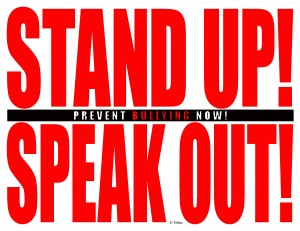We recently took to our Facebook page to start our conversation with our friends and fans about bullying. With the new movie “Bully” making headlines, we asked this question:
How do you tell your kids/students to deal with bullying?
It didn’t take long to get the conversation going. Forty-seven parents, including teachers, nurses, and firefighters, shared their parenting tips with us. In our responses, we saw a lot of common themes. The most common response? Tell a responsible adult. Here are some of the other popular responses:
- Ignore or avoid the bully
- Stand up for yourself: give an assertive response and fight back if things get physical
- Stick with your friends and be sure to stand up for each other
Our Facebook chat got us thinking. What do experts recommend?
The U.S. Department of Health and Human Services launched a Stop Bullying web site, so that’s where I first looked for answers. The site is very helpful, complete with clear definitions on what constitutes bullying, what classifies different types of bullying, and how parents and teachers can work together to stop and address bullying. I also particularly enjoyed the cyberbullying section.
And guess what?? Our Facebook fans were right! (They’re so smart.)
Experts recommend that the BEST thing to do about bullying is….
talk about it.
Talk about it at home. Talk about in schools. Talk about it with friends.
So let’s talk about bullying. If your kid is a victim or witness of bullying, they certainly aren’t alone. Check out some of these statistics:
- An estimated 160,000 children miss school every day due to fear of attack of intimidation by other students. Source: National Education Association
- Ninety percent of 4th through 8th graders report being victims of bullying. Source: MakeBeatsNotBeatdowns.org
- Nearly 9 out of 10 LGBT youth reported being verbally harassed at school in the past year because of their sexual orientation. Source: Gay, Lesbian and Straight Education Network
- Harassment and bullying have been linked to 75% of school-shooting incidents. Source: MakeBeatsNotBeatdowns.org
- A new review of studies from 13 counties found signs of an apparent connection between bullying, being bullied, and suicide. Source: Yale School of Medicine
- Seventy-one percent of students report incidents of bullying as a problem at their school. Source: MakeBeatsNotBeatdowns.org
- 1 out of 20 students has seen a student with a gun at school. Source: MakeBeatsNotBeatdowns.org
Now let’s talk about stopping bullying. Here are some resources for parents (and kids of all ages!) on how to stop bullying, or who you can talk to if you (or your kids) are a victim:
- The US Department of Health and Human Services “Stop Bullying” web site (be sure to check out this map of state anti-bullying laws and policies)
- Pacer Kids Against Bullying: Great games, videos, and celebrity testimonials for kids of all ages
- The Ophelia Project: The Ophelia Project serves youth and adults who are affected by relational and other non-physical forms of aggression by providing them with a unique combination of tools, strategies and solutions.
- The Trevor Project: The Trevor Project operates the only nationwide, around-the-clock crisis and suicide prevention helpline for lesbian, gay, bisexual, transgender and questioning youth. The Trevor Project offers a free and confidential 24/7 helpline and educational services.
- Educators Receive $1,000 Athletic Grants from California Casualty - May 22, 2024
- Music & Arts Grant Recipients – 2023 - December 1, 2023
- How to Tell When You Need New Brakes - November 20, 2023

